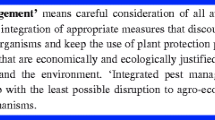Abstract.
The European Food Safety Authority (EFSA) is requested to assess the scientific quality of Post Market Environmental Monitoring (PMEM) plans submitted with each application for deliberate release of genetically modified (GM) plants according to part C of EU Directive 2001/18/EC and according to EU Regulation 1829/2003. PMEM aims at identifying unanticipated adverse effects on human health or the environment which could arise directly or indirectly from GM plants. PMEM is composed of case-specific monitoring and general surveillance. Case-specific monitoring is not obligatory but may be required to verify the environmental risk assessment. A general surveillance plan is compulsory and aims at identifying unanticipated adverse effects. General surveillance is not hypothesis-driven but is a general overseeing of the environment making use of existing surveillance systems in addition to developing more focused monitoring systems (e. g. farm questionnaires). Data quality, management and statistical analysis are of high importance in the design of general surveillance plans. Comparison should be made with appropriate baseline data. The EFSA GMO Panel also makes a number of recommendations for the management and conduct of PMEM by both applicants and risk managers.
Zusammenfassung.
Die Europäische Lebensmittelbehörde (EFSA) ist aufgefordert, die wissenschaftliche Qualität von Plänen zur Umweltbeobachtung (PMEM) von Inverkehr-gebrachten gentechnisch veränderten (GM) Pflanzen zu bewerten, wenn sie als Bestandteil von Inverkehrbringensanträgen nach der Direktive 2001/18/EC an die EFSA weitergeleitet werden. Die Zuständigkeit nach Verordnung 1829/2003 ist in jedem Antragsfall gegeben. Die PMEM ist auf die Identifizierung nachteiliger Effekte auf die menschliche Gesundheit und die Umwelt gerichtet, die direkt oder indirekt von GM-Pflanzen verursacht werden könnten. PMEM ist gegliedert in fallspezische und allgemeine Beobachtung. Die fallspezifische Beobachtung ist nicht obligatorisch, sondern richtet sich nach dem Ergebnis der Umweltverträglichkeitsprüfung. Die allgemeine Beobachtung ist immer notwendig und fokussiert sich auf die Erkennung von unvorhergesehen nachteiligen Effekten. Die allgemeine Beobachtung ist nicht von Hypothesen geleitet, sondern betrachtet übersichtsweise die Umwelt mit Hilfe bestehender Beobachtungssysteme zusätzlich zur Einrichtung fokussierter Erhebungssysteme wie landwirtschaftlicher Betriebsfragebögen. Die Datenqualität, das Management und die Analyse sind von großer Bedeutung für das Design der allgemeinen Beobachtungspläne. Vergleiche sollten mit angemessenen Grundlagendaten durchgeführt werden. Das wissenschaftliche Gremium der EFSA gibt zahlreiche Empfehlungen für das Management und die Durchführung von PMEM für Antragsteller und Risikomanager.
Similar content being viewed by others
Author information
Authors and Affiliations
Corresponding author
Additional information
Received: September 8, 2006
Rights and permissions
About this article
Cite this article
Bartsch, D., Bigler, F., Castanera, P. et al. Concepts for General Surveillance of Genetically Modified (GM) Plants: The EFSA position. J. Verbr. Lebensm. 1 (Suppl 1), 15–20 (2006). https://doi.org/10.1007/s00003-006-0063-9
Published:
Issue Date:
DOI: https://doi.org/10.1007/s00003-006-0063-9




